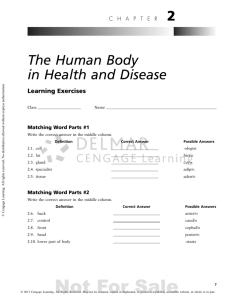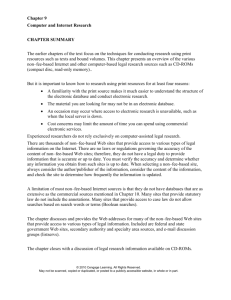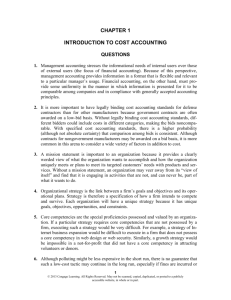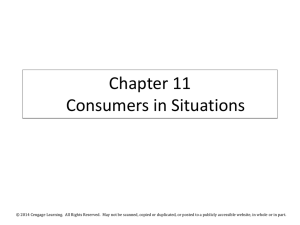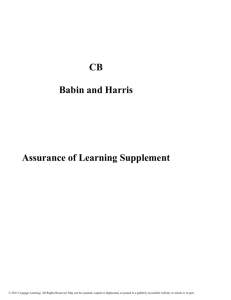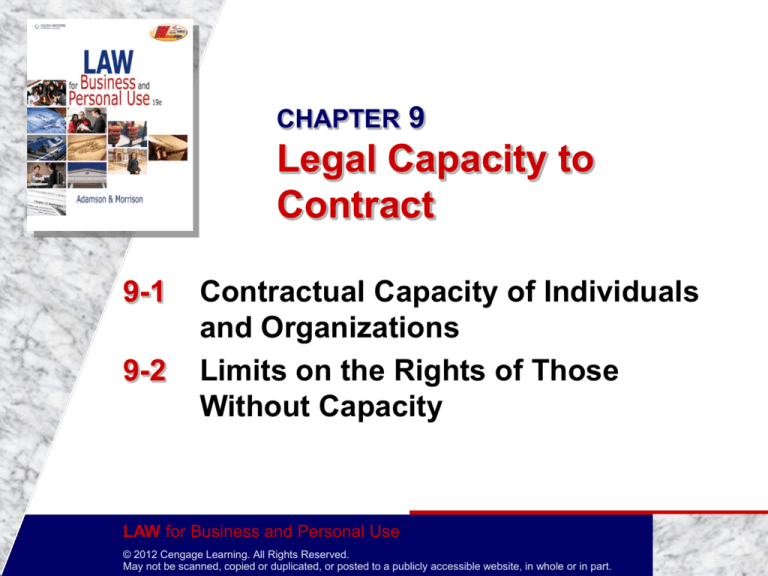
CHAPTER 9
Legal Capacity to
Contract
9-1
9-2
Contractual Capacity of Individuals
and Organizations
Limits on the Rights of Those
Without Capacity
LAW for Business and Personal Use
© 2012 Cengage Learning. All Rights Reserved.
May not be scanned, copied or duplicated, or posted to a publicly accessible website, in whole or in part.
9-1 Contractual Capacity of
Individuals and Organizations
GOALS
Identify parties who lack contractual capacity
Explain the role of capacity in organizations
LAW for Business and Personal Use
Chapter 9
© 2012 Cengage Learning. All Rights Reserved.
May not be scanned, copied or duplicated, or posted to a publicly accessible website, in whole or in part.
SLIDE 2
WHAT IS CAPACITY?
Protections for those who lack capacity
1. Minors
2. Those mentally incapacitated
3. The intoxicated
LAW for Business and Personal Use
Chapter 9
© 2012 Cengage Learning. All Rights Reserved.
May not be scanned, copied or duplicated, or posted to a publicly accessible website, in whole or in part.
SLIDE 3
CHECKPOINT
What three classifications of individuals lack
contractual capacity?
LAW for Business and Personal Use
Chapter 9
© 2012 Cengage Learning. All Rights Reserved.
May not be scanned, copied or duplicated, or posted to a publicly accessible website, in whole or in part.
SLIDE 4
Capacity
Contractual capacity is defined by the law
to mean the ability to understand the
consequences of a contract.
Age of majority to contract is 18, a few
states it is 19 and 21.
Minority, or the state of being below the age
of majority, end the day before the birthday
of the age legally set as the age of majority.
LAW for Business and Personal Use
Chapter 9
© 2012 Cengage Learning. All Rights Reserved.
May not be scanned, copied or duplicated, or posted to a publicly accessible website, in whole or in part.
SLIDE 5
Capacity
Emancipation – is the severing of the childparent relationship.
Minors may find themselves bound to their
contracts if they are emancipated
Formal emancipation occurs when a court
decrees the minor emancipated.
Informal emancipation arises from the
conduct of the minor and the parent
LAW for Business and Personal Use
Chapter 9
© 2012 Cengage Learning. All Rights Reserved.
May not be scanned, copied or duplicated, or posted to a publicly accessible website, in whole or in part.
SLIDE 6
Evidence of Informal Emancipation
The parent and minor agree that the parent
will cease support.
The minor marries
The minor moves out of the family home
The minor becomes a member of the armed
forces
The minor gives birth
The minor undertakes full-time employment.
(states differ greatly in their treatment of
emancipated minors)
LAW for Business and Personal Use
Chapter 9
© 2012 Cengage Learning. All Rights Reserved.
May not be scanned, copied or duplicated, or posted to a publicly accessible website, in whole or in part.
SLIDE 7
WHO HAS CONTRACTUAL
CAPACITY IN ORGANIZATIONS?
Scope of authority
Employer grants authority to employee
Assumption of authority based on job title
LAW for Business and Personal Use
Chapter 9
© 2012 Cengage Learning. All Rights Reserved.
May not be scanned, copied or duplicated, or posted to a publicly accessible website, in whole or in part.
SLIDE 8
What’s your verdict?
Alexis, 15 was an avid television fan.
Combining her Christmas money with the
money she received form babysitting, she
went to the local electronics store to buy
boxed DVD collections of her favorite shows.
At the store, a salesperson convinced her to
instead buy a new flat-screen tv, capable of
showing the upcoming episodes in 3-D.
LAW for Business and Personal Use
Chapter 9
© 2012 Cengage Learning. All Rights Reserved.
May not be scanned, copied or duplicated, or posted to a publicly accessible website, in whole or in part.
SLIDE 9
What’s your verdict?
Having recently seen several movies in 3-D
theaters, she readily agreed. The purchase
took nearly all of her money.
When she arrived home with the new TV, her
brother was astonished and commented that
it would be two or three years before 3-D
shows were available from the local cable or
television stations.
LAW for Business and Personal Use
Chapter 9
© 2012 Cengage Learning. All Rights Reserved.
May not be scanned, copied or duplicated, or posted to a publicly accessible website, in whole or in part.
SLIDE 10
What’s your verdict?
Alexis realized she had made a bad mistake
and wanted to get her money back
Can Alexis get her money back?
LAW for Business and Personal Use
Chapter 9
© 2012 Cengage Learning. All Rights Reserved.
May not be scanned, copied or duplicated, or posted to a publicly accessible website, in whole or in part.
SLIDE 11
CHECKPOINT
What is the legal significance to a business
of an employee’s scope of authority?
When doing business with organizations, it is
important to ensure that the person signing
the contract has the scope and authority to
bind the organization. People acting outside
the scope of their authority generally are
personally liable when the organization isn’t.
LAW for Business and Personal Use
Chapter 9
© 2012 Cengage Learning. All Rights Reserved.
May not be scanned, copied or duplicated, or posted to a publicly accessible website, in whole or in part.
SLIDE 12
9-2
Limits on the Rights of Those
Without Capacity
GOALS
Recognize the time frame during which a contract
can be disaffirmed
Identify contracts that cannot be disaffirmed
Discuss the effects of misrepresentation of age
on contractual responsibilities
LAW for Business and Personal Use
Chapter 9
© 2012 Cengage Learning. All Rights Reserved.
May not be scanned, copied or duplicated, or posted to a publicly accessible website, in whole or in part.
SLIDE 13
WHEN CAN DISAFFIRMANCE OCCUR
AND WHAT MUST BE DONE AT THAT
TIME?
Any time while still under the incapacity
Within a reasonable time after attaining
capacity
Disaffirmance – means a refusal to be bound
by a previous legal commitment.
Generally, a person lacking contractual capacity
can disaffirm a contract for goods and services
that are not necessities.
Any time while still under the incapacity OR
Within a reasonable time after attaining capacity.
LAW for Business and Personal Use
Chapter 9
© 2012 Cengage Learning. All Rights Reserved.
May not be scanned, copied or duplicated, or posted to a publicly accessible website, in whole or in part.
SLIDE 14
WHEN CAN DISAFFIRMANCE OCCUR AND
WHAT MUST BE DONE AT THAT TIME?
Ratification – is action by the party indicating
intent to be bound by the contract.
For a minor, ratification must occur after
achieving majority.
Ratification may consist of either of the
following:
Giving a new promise to perform as agreed OR
Any act (such as making payments to the seller)
that clearly indicates the party’s intention to be
bound
LAW for Business and Personal Use
Chapter 9
© 2012 Cengage Learning. All Rights Reserved.
May not be scanned, copied or duplicated, or posted to a publicly accessible website, in whole or in part.
SLIDE 15
WHAT MUST BE DONE UPON
DISAFFIRMANCE?
Loss of value – In most states if minors are
unable to return exactly what was received
under the contract, they can still get back
everything they gave.
This is true even if a minor returns used or
damage goods.
It is also true even if a minor returns nothing
because the goods have been lost,
consumed or destroyed.
LAW for Business and Personal Use
Chapter 9
© 2012 Cengage Learning. All Rights Reserved.
May not be scanned, copied or duplicated, or posted to a publicly accessible website, in whole or in part.
SLIDE 16
WHAT MUST BE DONE UPON
DISAFFIRMANCE?
Obligations of party with capacity
Not only can the party lacking capacity generally
disaffirm contracts for goods and services that are
not necessaries, but should he or she choose to,
the party lacking capacity can enforce them
against the party with capacity.
Generally, the party with capacity can neither
enforce against a party lacking capacity nor avoid
on the basis of the other party’s lack of capacity
all or any part of a contract for goods and
services that are not necessities.
LAW for Business and Personal Use
Chapter 9
© 2012 Cengage Learning. All Rights Reserved.
May not be scanned, copied or duplicated, or posted to a publicly accessible website, in whole or in part.
SLIDE 17
DISAFFIRMANCE TIMELINE
LAW for Business and Personal Use
Chapter 9
© 2012 Cengage Learning. All Rights Reserved.
May not be scanned, copied or duplicated, or posted to a publicly accessible website, in whole or in part.
SLIDE 18
CHECKPOINT
When can a person who lacks contractual
capacity disaffirm a contract?
Any time while still under the incapacity
Within a reasonable time after attaining capacity
LAW for Business and Personal Use
Chapter 9
© 2012 Cengage Learning. All Rights Reserved.
May not be scanned, copied or duplicated, or posted to a publicly accessible website, in whole or in part.
SLIDE 19
CONTRACTS THAT CANNOT BE
DISAFFIRMED
Court-approved contracts – In all states
minors cannot void any contracts approved
for them by a court.
Major commitments
Armed Forces
Marriage
Educational Loans
Banking contracts – most states, minors are
permitted to make deposits in banks.
LAW for Business and Personal Use
Chapter 9
© 2012 Cengage Learning. All Rights Reserved.
May not be scanned, copied or duplicated, or posted to a publicly accessible website, in whole or in part.
SLIDE 20
CONTRACTS THAT CANNOT BE
DISAFFIRMED
Insurance contracts – more than one-half of
the states provide that minors who are over a
certain age may not disaffirm certain
contracts of insurance.
Work-related contracts – In most states
minors who engage in a business or trade
cannot disaffirm agreements involving their
business
LAW for Business and Personal Use
Chapter 9
© 2012 Cengage Learning. All Rights Reserved.
May not be scanned, copied or duplicated, or posted to a publicly accessible website, in whole or in part.
SLIDE 21
CONTRACTS THAT CANNOT BE
DISAFFIRMED
Sale of realty – In some states, a minor who
owns real property and sells it or borrows
money against it cannot disaffirm until after
reaching majority.
Apartment rental – In a few states, the lease
of an apartment cannot be disaffirmed even
if the apartment is not necessary.
LAW for Business and Personal Use
Chapter 9
© 2012 Cengage Learning. All Rights Reserved.
May not be scanned, copied or duplicated, or posted to a publicly accessible website, in whole or in part.
SLIDE 22
CHECKPOINT
What contracts entered into by minors
cannot be disaffirmed in any of the 50
states?
Court-approved contracts
Major commitments
Banking contracts
Insurance contracts
Sale of realty
Apartment rental
LAW for Business and Personal Use
Chapter 9
© 2012 Cengage Learning. All Rights Reserved.
May not be scanned, copied or duplicated, or posted to a publicly accessible website, in whole or in part.
SLIDE 23
CONTRACTUAL EFFECT OF
MISREPRESENTING AGE
Other party to the contract may collect
damages
Minor still may be able to disaffirm contract
LAW for Business and Personal Use
Chapter 9
© 2012 Cengage Learning. All Rights Reserved.
May not be scanned, copied or duplicated, or posted to a publicly accessible website, in whole or in part.
SLIDE 24
CHECKPOINT
If minors lie about their age, what happens in
most states with regard to their ability to
disaffirm contracts for goods and services
that are not necessaries?
LAW for Business and Personal Use
Chapter 9
© 2012 Cengage Learning. All Rights Reserved.
May not be scanned, copied or duplicated, or posted to a publicly accessible website, in whole or in part.
SLIDE 25
PREVENT
LEGAL
DIFFICULTIES
In making contracts . . .
Always observe and remember factors about the
other person indicating whether or not they have
full contractual capacity. If you are dealing with a
representative of a business, ask questions about
the person’s ability to bind the organization in
contract.
Ask for identification for anyone who looks like
they are within a decade of the age of majority.
Continued on the next slide
LAW for Business and Personal Use
Chapter 9
© 2012 Cengage Learning. All Rights Reserved.
May not be scanned, copied or duplicated, or posted to a publicly accessible website, in whole or in part.
SLIDE 26
IN THIS CASE
Lamon, a minor, bought a diamond
engagement ring and necklace for his
fiancée, Mary. He paid for the items in
weekly installments of $10.
One day while still a minor, he and Mary
quarreled.
Mary returned the ring
Mary refused to return the necklace
LAW for Business and Personal Use
Chapter 9
© 2012 Cengage Learning. All Rights Reserved.
May not be scanned, copied or duplicated, or posted to a publicly accessible website, in whole or in part.
SLIDE 27
IN THIS CASE
Mary was legally entitled to keep the
necklace because it was an ordinary gift not
connected with the proposed marriage.
Lamon could return the ring to the jeweler
and demand a refund of money he had paid
for both pieces of jewelry
Is Lamon entitled to the money he had paid
on the ring?
LAW for Business and Personal Use
Chapter 9
© 2012 Cengage Learning. All Rights Reserved.
May not be scanned, copied or duplicated, or posted to a publicly accessible website, in whole or in part.
SLIDE 28
YES
In most states, he is even entitled to what he
paid on the necklace, that is because he
returned everything that was still in his
possession.
In some state, however, a minor must return
everything received in a condition as good as
it was when it was received.
If this cannot be done, the minor must pay
the difference in value, or deduct the
difference from the amount to be refunded.
In these states, Lamon could be unable to
recover the price of the necklace.
LAW for Business and Personal Use
Chapter 9
© 2012 Cengage Learning. All Rights Reserved.
May not be scanned, copied or duplicated, or posted to a publicly accessible website, in whole or in part.
SLIDE 29
PREVENT
LEGAL
DIFFICULTIES
If the people you want to contract with have
alcohol on their breath, watch for signs of
drunkenness. If they display these symptoms and
you still want to contract with them, be sure you
have a witness or other proof of the fact that they
know they are making a contract.
Remember the other party in a transaction is
seldom primarily concerned with your best
interest and generally is not obligated to volunteer
information about their capacity.
Continued on the next slide
LAW for Business and Personal Use
Chapter 9
© 2012 Cengage Learning. All Rights Reserved.
May not be scanned, copied or duplicated, or posted to a publicly accessible website, in whole or in part.
SLIDE 30
PREVENT
LEGAL
DIFFICULTIES
When contracting with the elderly, be certain that
they can understand the consequences of any
contract you enter into with them.
If you are a minor, do not misrepresent your age.
The consequences may hurt you more than not
being allowed to contract.
LAW for Business and Personal Use
Chapter 9
© 2012 Cengage Learning. All Rights Reserved.
May not be scanned, copied or duplicated, or posted to a publicly accessible website, in whole or in part.
SLIDE 31



